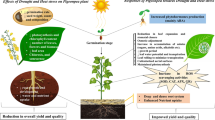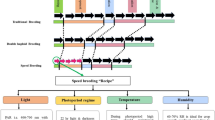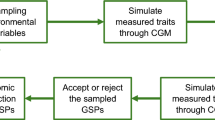Abstract
Global climate changes can dramatically impact wheat production in Brazil’s Cerrado biome, considered a new wheat farming frontier. Therefore, new approaches are needed to better understand the G×E interaction in environments that are highly dissimilar in terms of climate variables. Here, we integrate envirotyping, adaptability, and stability techniques to better understand the G × E interaction and provide new insights for the recommendation of tropical wheat genotypes that can perform well in hotter and drier environments. Thirty-six wheat genotypes were evaluated for grain yield in eight field trials in 2018, 2019, and 2020 in the Brazilian tropical region. There is strong evidence that even in irrigated conditions, temperatures > 30 °C during the booting and heading/flowering stages dramatically reduce the grain yield. Two lines, VI14774 (GY = 3800 kg ha−1), and VI14980 (GY = 4093 kg ha−1) had better performance in the hotter environment (~ 22% and ~ 32% higher than the grand mean) and are potential germplasm sources for warmer environments at the boosting and heading/flowering stages. In this study, the REML/BLUP and GGE Biplot methods highly correlate in terms of genotype classification for selection and recommendation purposes. The genotypes VI 14127, VI 14197, VI 14026, and BRS 264 are the closest to a hypothetical ideal genotype. Overall, this study provides new insights on how the environment typing can be useful to better understand the genotype-by-environment interaction and help to breed new climate-resilient wheat cultivars for the Brazilian tropical region.






Similar content being viewed by others
References
Albrecht JC, Vieira EA, Só e Silva M, Andrade JMV, Scheeren PL, Trindade MG, Sobrinho JS, Sousa CNA, Reis WP, Ribeiro Júnior WQ, Fronza V, Cargnin A, Yamanaka CH (2007) Adaptabilidade E estabilidade de genótipos de trigo irrigado no Cerrado do Brasil Central. Pesqui Agropecu Bras 42:1727–1734. https://doi.org/10.1590/S0100-204X2007001200009
Alves RS, Peixoto LA, Teodoro PE, Silva LA, Rodrigues EV, Resende MDV, Bruno Galveas Laviola BG, Bhering LL (2018) Selection of Jatropha curcas families based on temporal stability and adaptability of genetic values. Ind Crops Prod 119:290–293. https://doi.org/10.1016/j.indcrop.2018.04.029
Bányai J, Kiss T, Gizaw SA, Mayer M, Spitkó T, Tóth V, Kuti C, Mészáros K, Láng L, Karsai I, Vida G (2020) Identification of superior spring durum wheat lines under irrigated and rain-fed conditions. Cereal Res Commun 48:355–364. https://doi.org/10.1007/s42976-020-00034-z
Beche E, da Silva CL, Todeschini MH, Milioli AS, Benin G, Marchese JA (2018) Improvement in Brazilian wheat breeding: changes in developmental phases and ecophysiological traits. Euphytica 214:56. https://doi.org/10.1007/s10681-018-2134-2
Boff T, Espindula LF, Bücker-Neto L, Minella E, Milach SCK, Silva PR (2019) Inheritance of aluminum tolerance in the wheat cultivar Toropi and new findings about the introduction of this trait into the Brazilian wheat germplasm. Environ Exp Bot 157:91–99. https://doi.org/10.1016/j.envexpbot.2018.10.007
Bornhofen E, Todeschini MH, Stoco MG, Madureira A, Marchioro VS, Storck L, Benin G (2018) Wheat yield improvements in Brazil: roles of genetics and environment. Crop Sci 58:1082–1093. https://doi.org/10.2135/cropsci2017.06.0358
Casagrande CR, Mezzomo HC, Cruz CD, Borém A, Nardino M (2020) Choosing parent tropical wheat genotypes through genetic dissimilarity based on REML/BLUP. Crop Breed Appl Biotechnol 20:e329129316. https://doi.org/10.1590/1984-70332020v20n3a50
CONAB – Companhia Nacional de Abastecimento (2020) Acompanhamento da safra brasileira de grãos. Disponível em: https://www.conab.gov.br/ingo-agro/safras/graos/boletim-da-safra-de-graos. Acesso em: 27 de dez de 2021
Costa-Neto G, Fritsche-Neto R (2021) Enviromics: bridging different sources of data, building one framework. Crop Breed Appl Biotechnol 21(S):e393521S12
Costa-Neto G, Galli G, Carvalho HF, Crossa J, Fritsche-Neto R (2021a) EnvRtype: a software to interplay enviromics and quantitative genomics in agriculture. G3 Genes Genom Genet 11:jkab040. https://doi.org/10.1093/g3journal/jkab040
Costa-Neto G, Fritsche-Neto R, Crossa J (2021) Nonlinear kernels, dominance, and envirotyping data increase the accuracy of genome-based prediction in multi-environment trials. Heredity 126:92–106. https://doi.org/10.1038/s41437-020-00353-1
Crossa J, Fritsche-Neto R, Montesinos-Lopez OA, Costa-Neto G, Dreisigacker S, Montesinos-Lopez A, Bentley AR (2021) The modern plant breeding triangle: optimizing the use of genomics, phenomics, and enviromics data. Front Plant Sci 12:651480. https://doi.org/10.3389/fpls.2021.651480
Cruz CD, Castoldi F (1991) Decomposição Da interação genótipos x ambientes em partes simples e complexa. Rev Ceres 38:422–430
Cruz CD, Regazzi AJ, Carneniro PCS (2012) Modelos biométricos aplicados ao melhoramento genético. UFV, Viçosa, p 514
Djanaguiraman M, Prasad PVV, Seppanen M (2010) Selenium protects sorghum leaves from oxidative damage under high temperature stress by enhancing antioxidant defense system. Plant Physiol Biochem 48:999–1007. https://doi.org/10.1016/j.plaphy.2010.09.009
EMBRAPA—Empresa Nacional de Pesquisa Agropecuária (2020) Informações técnicas para trigo e triticale: 13ª Reunião da Comissão Brasileira de Pesquisa de Trigo e Triticale. Embrapa Trigo, Passo Fundo, p 256
EMBRAPA – Empresa Nacional de Pesquisa Agropecuária (2020) Consumo Per capita de Arroz (Oryza sativa L.) e de Feijão-comum (Phaseolus vulgaris L.), no Brasil, de 1985 a 2020. Disponível em: <https://www.cnpaf.embrapa.br/socioeconomia/docs/arroz/consumopercapitaarrozefeijao.htm . Acesso em: 27 de dez de 2021
Farooq M, Bramley H, Palta JA, Siddique KHM (2011) Heat stress in wheat during reproductive and grain-filling phases. Crit Rev Plant Sci 30:1–17. https://doi.org/10.1080/07352689.2011.615687
Goddard R, Steed A, Chinoy C, Ferreira JR, Pedro Luiz Scheeren PL, Maciel JLN, Caierão E, Torres GAM, Consoli L, Santana FM, Fernandes JMC, Simmonds J, Uauy C, Cockram J, Nicholson P (2020) Dissecting the genetic basis of wheat blast resistance in the Brazilian wheat cultivar BR 18-Terena. BMC Plant Biol 20:398. https://doi.org/10.1186/s12870-020-02592-0
Gomes DP, Rocha VS, Rocha JRAS, Souza MA, Pereira OL (2019) Progresso temporal da brusone do trigo em função do inóculo primário, Da aplicação De Fungicida E Da resistência dos genótipos. Summa Phytopathol 45:50–58. https://doi.org/10.1590/0100-5405/187354
Gonçalves GMC, Ferreira-Gomes RL, Lopes ACA, Vieria PFMJ (2020) Adaptability and yield stability of soybean genotypes by REML/BLUP and GGE biplot. Crop Breed Appl Biotechnol 20:e282920217. https://doi.org/10.1590/1984-70332020v20n2a33
Heinemann AB, Costa-Neto G, Fritsche-Neto R, da Matta DH, Fernandes IK (2022) Enviromic prediction is useful to define the limits of climate adaptation: a case study of common bean in Brazil. Field Crops Res 286:108628. https://doi.org/10.1016/j.fcr.2022.108628
Hofmann GS, Cardoso MF, Alves RJV, Weber EJ, Barbosa AA, de Toledo PM, Pontual FB, Salles LO, Hasenack H, Cordeiro JLP, Aquino FE, Oliveira LFB (2021) The Brazilian Cerrado is becoming hotter and drier. Glob Chang Biol 27:4060–4073. https://doi.org/10.1111/gcb.15712
Jarquin D, Silva CL, Gaynor RC, Poland J, Fritz A, Howard, Battenfield, Crossa J (2017) Increasing genomic-enabled prediction accuracy by modeling genotype X environment interactions in Kansas wheat. Plant Genome 10:1–15. https://doi.org/10.3835/plantgenome2016.12.0130
Jenner CF, Ugalde TD, Aspinall D (1991) The physiology of starch and protein deposition in the endosperm of wheat. Aust J Plant Physiol 18:211–226. https://doi.org/10.1071/PP9910211
Johansson E, Branlar G, Cuniberti M, Flagella Z, Hüsken A, Nurit E, Peña RJ, Sissons M, Vazquez D (2020) Genotypic and environmental effects on wheat technological and nutritional quality. In: Igrejas G, Ikeda T, Guzmán C. (eds) Wheat quality for improving processing and human health, pp 171–204. https://doi.org/10.1007/978-3-030-34163-3_8
Kassambara A, Mundt F (2020) factoextra: Extract and visualize the results of multivariate data analyses. Retrieved from https://cran.r-project.org/package=factoextra
Lin CS, Binns MR (1988) A superiority measure of cultivar performance for cultivar x location data. Can J Plant Sci 68:193–198. https://doi.org/10.4141/cjps88-018
Lozada DN, Carter AH (2020) Insights into the genetic architecture of phenotypic stability traits in winter wheat. Agronomy 10:368. https://doi.org/10.3390/agronomy10030368
Machado e Silva C, Mezzomo HC, Casagrande CR, Lima GW, Olivoto T, Nardino M (2021) Selection of tropical wheat lines based on classical and modern parameters of adaptability and stability. Bulg J Agric Sci 27:933–941
Marengo JA, Jimenez JC, Espinoza JC, Cunha AP, Aragão LEO (2022) Increased climate pressure on the agricultural frontier in the Eastern Amazonia–Cerrado transition zone. Sci Rep 12:457. https://doi.org/10.1038/s41598-021-04241-4
Mezzomo HC, Casagrande CR, Sousa DJP, Borém A, Silva FFE, Nardino M (2021) Mixed model-based Jinks and Pooni method to predict segregating populations in wheat breeding. Crop Breed Appl Biotechnol 21:e38352143. https://doi.org/10.1590/1984-70332021v21n4a52
Mezzomo HC, Casagrande CR, Machado e Silva C, Borém A, Nardino M (2021) Association between physiological and agronomic traits and selection of tropical wheat. J Crop Sci Biotechnol 24:167–177. https://doi.org/10.1007/s12892-020-00069-y
Mingoti R, Holler WA, Spadotto CA (2014) Produção Potencial De Trigo no Brasil. Embrapa Gestão Territorial, Campinas. Disponível em
Mohammadi R, Aemion M, Zadhasan E, Ahmadi MM, Amri A (2018) The use of AMMI model for interpreting genotype x environment interaction in durum wheat. Exp Agric 54:670–683. https://doi.org/10.1017/S0014479717000308
Mushayi M, Shimelis H, Derera J, Shayanowako AIT, Mathew I (2020) Multi-environmental evaluation of maize hybrids developed from tropical and temperate lines. Euphytica 216:1–14. https://doi.org/10.1007/s10681-020-02618-6
Nardino M, Perin EC, Aranha BC, Carpes ST, Fontoura BH, de Sousa DJP, Freitas DSD (2022) Understanding drought response mechanisms in wheat and multi-trait selection. PLoS ONE 17:e0266368. https://doi.org/10.1371/journal.pone.0266368
Nardino M, Silva FF, Olivoto T, Barros WS, Carvalho CGD, Signorini VS, Mezzomo HC, Casagrande CR (2022) Meta-analysis of the experimental coefficient of variation in wheat using the bayesian and frequentist approaches. Sci Agric 80:e20210190. https://doi.org/10.1590/1678-992X-2021-0190
Nehe A, Akin B, Sanal T, Evlice AK, Ünsal R, Dinçer N, Demir L, Geren H, Sevim I, Orhan S, Yaktubav S, Ezici A, Guzman C, Morgounov A (2019) Genotype x environment interaction and genetic gain for grain yield and grain quality traits in Turkish spring wheat released between 1964 and 2010. PLoS ONE 14:e0219432. https://doi.org/10.1371/journal.pone.0219432
Ni Z, Li H, Zhao Y, Peng H, Hu Z, Xin M, Sun Q (2018) Genetic improvement of heat tolerance in wheat: recent progress in understanding the underlying molecular mechanisms. Crop J 6:32–41. https://doi.org/10.1016/j.cj.2017.09.005
Nuttall JG, Barlow KM, Delahunty AJ, Christy BP, O’Leary GJ (2018) Acute high temperature response in wheat. Agron J 110:1296–1308. https://doi.org/10.2134/agronj2017.07.0392
Oliveira MEAS, Alves TO, Gutkoski LC, Miranda MZ, Ferreira MSL, Takeiti CY (2021) Brazilian Cerrado wheat: Technological quality of genotypes grown in tropical locations. J Food Process Preserv 00:e16228. https://doi.org/10.1111/jfpp.16228
Olivoto T, Lúcio ADC (2020) Metan: an R package for multi-environment trial analysis. Methods Ecol Evol 11:783–789. https://doi.org/10.1111/2041-210X.13384
Olivoto T, Lúcio ADC, Silva JAG, Marchioro VS, Souza VQ, Jost E (2019) Mean performance and stability in multi-environment trials I: combining features of AMMI and BLUP techniques. Agron J 111:2949–2960. https://doi.org/10.2134/agronj2019.03.0220
Pasinato A, Cunha GR, Fontana DC, Monteiro JEBA, Nakai AM, Oliveira AF (2018) Potential área and limitations for the expansion of rainfed wheat in the Cerrado biome Central Brazil. Pesqui Agropecu Bras 54:779–790. https://doi.org/10.1590/S0100-204X2018000700001
Peixoto MA, Evangelista JSPC, Alves RS, Farias FJC, Carvalho LP, Teodoro LPR, Teodoro PE, Bhering LL (2021) Models for optimizing selection based on adaptability and stability of cotton genotypes. Cienc Rural 51:e20200530. https://doi.org/10.1590/0103-8478cr20200530
Pereira JF, Cunha GR, Moresco ER (2019) Improved drought tolerance in wheat is required to unlock the production potential of the Brazilian Cerrado. Crop Breed Appl Biotechnol 19:217–225. https://doi.org/10.1590/1984-70332019v19n2r30
Pinto RS, Molero G, Reynolds MP (2017) Identification of heat tolerant wheat lines showing genetic variation in leaf respiration and other physiological traits. Euphytica 213:76. https://doi.org/10.1007/s10681-017-1858-8
Pradhan GP, Prasad PVV, Fritz AK, Kirkham MB, Gill BS (2012) Effects of drought and high temperature stress on synthetic hexaploid wheat. Funct Plant Biol 39:190–198. https://doi.org/10.1071/FP11245
Prasad PVV, Pisipati SR, Mutava RN, Tuinstra MR (2008) Sensitivity of grain sorghum to high temperature stress during reproductive development. Crop Sci 48:1911–1917. https://doi.org/10.2135/cropsci2008.01.0036
Prasad PVV, Pisipati SR, Ristic Z, Bukovnik U, Fritz AK (2008) Impact of nighttime temperature on physiology and growth of spring wheat. Crop Sci 48:2372–2380. https://doi.org/10.2135/cropsci2007.12.0717
Rad MRN, Kadir MA, Rafii MY, Jaafar HZE, Naghavi MR, Ahmadi F (2013) Genotype × environment interaction by AMMI and GGE biplot analysis in three consecutive generations of wheat (Triticum aestivum) under normal and drought stress conditions. Aust J Crop Sci 7:956–961
Rapp M, Lein V, Lacoudre F, Fafferty J, Müller E, Vida G, Bozhanova V, Ibraliu A, Thorwarth P, Piepho HP, Leiser WL, Würscchum T, Longin CFH (2018) Simultaneous improvement of grain yield and protein content in durum wheat by different phenotypic indices and genomic selection. Theor Appl Genet 131:1315–1329. https://doi.org/10.1007/s00122-018-3080-z
Reboita MS, Kuki CAC, Marrafon VH, de Souza CA, Ferreira GWS, Teodoro T, Lima JWM (2022) South America climate change revealed through climate indices projected by GCMs and Eta-RCM ensembles. Clim Dyn 58:459–485. https://doi.org/10.1007/s00382-021-05918-2
Resende MDV (2016) Software selegen-REML/BLUP: a useful tool for plant breeding. Crop Breed Appl Biotechnol 16:330–339. https://doi.org/10.1590/1984-70332016v16n4a49
Resende MDV, Duarte JB (2007) Precisão E controle de qualidade em experimentos de avaliação de cultivares. Pesqui Agropecu Trop 37:182–194
Resende RT, Piepho HP, Rosa GJM, Silva-Júnior OB, Silva FF, Resende MDV, Grattapaglia D (2021) Enviromics in breeding: applications and perspectives on envirotypic-assisted selection. Theor Appl Genet 134:95–112. https://doi.org/10.1007/s00122-020-03684-z
Resende RT, Chenu K, Rasmussen SK, Heinemann AB, Fritsche-Neto R (2022) Enviromics in Plant Breeding 13:935380. https://doi.org/10.3389/fpls.2022.935380
Ristic Z, Bukovnik U, Prasad PVV (2007) Correlation between heat stability of thylakoid membranes andloss of chlorophyllin winter wheat under heat stress. Crop Sci 47:2067–2073. https://doi.org/10.2135/cropsci2006.10.0674
Robertson A (1959) Experimental design on the measurement of heritabilities and genetic correlations: biometrical genetics, 186th edn. Pergamon Press, New York. https://doi.org/10.2307/2527670
Sehgal D, Rosyara U, Mondal S, Singh R, Poland J, Dreisigacker S (2020) Incorporating genome-wide Association Mapping results into genomic prediction models for grain yield and yield stability in CIMMYT spring bread wheat. Front Plant Sci 11:197. https://doi.org/10.3389/fpls.2020.00197
Shpiler L, Blum A (1986) Differential reaction of wheat cultivars to hot environments. Euphytica 35:483–492. https://doi.org/10.1007/BF00021856
Silva RR, Benin G (2012) Análises Biplot: conceitos, interpretações e aplicações. Cienc Rural 42:1404–1412. https://doi.org/10.1590/S0103-84782012000800012
Stone PJ, Nicolas ME (1994) Wheat cultivars vary widely in their responses of grain yield and quality to short periods of postanthe-sis heat stress. Aust J Plant Physiol 21:887–900. https://doi.org/10.1071/PP9940887
Szareski VJ, Carvalho IR, Kehl K, Levien AM, Rosa TC, Souza VQ (2021) Adaptability and stability with multivariate definition of macroenvironments for wheat yield in Rio Grande do sul. Pesqui Agropecu Bras 56:e02468. https://doi.org/10.1590/S1678-3921.pab2021.v56.02468
Thungo Z, Shimelis H, Odindo A, Mashilo J (2021) Genetic gain for agronomic, physiological, and biochemical traits and quality attributes in bread wheat (Triticum aestivum L.): a meta-analysis. Euphytica 217:119. https://doi.org/10.1007/s10681-021-02846-4
USDA - United States Department of Agriculture (2020) Production supply and distribution (PSD) on-line. Disponível em: https://apps.fas.usda.gov/psdonline/app/index.html#/app/downloads. Acesseo em: 11 Nov
Verma A, Singh GP (2021) Stability, adaptability analysis of wheat genotypes by AMMI with BLUP for restricted irrigated multi location trials in Peninsular Zone of India. Agric Sci 12:198–212. https://doi.org/10.4236/as.2021.123013
Woyann LG, Zdziarski AD, Baretta D, Meira D, Dallacorte LV, Benin G (2019) Selection of high-yielding, adapted and stable wheat lines in preliminary trials. Crop Breed Appl Biotechnol 19:412–419. https://doi.org/10.1590/1984-70332019v19n4a58
Xu Y, Zhang X, Li H, Zheng H, Zhang J, Olsen MS, Varshney RK, Prasanna BM, Qian Q (2022) Smart breeding driven by big data, artificial intelligence, and integrated genomic-enviromic prediction. Mol Plant 15:1664–1695. https://doi.org/10.1016/j.molp.2022.09.001
Yan W, Tinker A (2006) Biplot analysis of multi environment trial data: principles and applications. Can J Plant Sci 86:623–645. https://doi.org/10.4141/P05-16
Yan W, Hunt LA, Sheng Q, Szlavnics Z (2000) Cultivar evaluation and mega-environment investigation based on the GGE biplot. Crop Sci 40:597–605. https://doi.org/10.2135/cropsci2000.403597x
Zhao H, Dai T, Jing Q, Jiang D, Cao W (2007) Leaf senescence and grain filling affected by post-anthesis high temperatures in two different wheat cultivars. Plant Growth Regul 51:149–158. https://doi.org/10.1007/s10725-006-9157-8
Acknowledgements
We appreciate the financial support from the Brazilian Government offered by the Conselho Nacional de Desenvolvimento Científico e Tecnológico (CNPq). This study was financed in part by the Coordenação de Aperfeiçoamento de Pessoal de Nível Superior (Capes)-Finance Code 001.
Author information
Authors and Affiliations
Corresponding author
Ethics declarations
Conflict of interest
The authors declare that they have no conflict of interest.
Additional information
Publisher’s Note
Springer Nature remains neutral with regard to jurisdictional claims in published maps and institutional affiliations.
Supplementary Information
Below is the link to the electronic supplementary material.
Rights and permissions
Springer Nature or its licensor (e.g. a society or other partner) holds exclusive rights to this article under a publishing agreement with the author(s) or other rightsholder(s); author self-archiving of the accepted manuscript version of this article is solely governed by the terms of such publishing agreement and applicable law.
About this article
Cite this article
Casagrande, C.R., Mezzomo, H.C., de Sousa, D.J.P. et al. Envirotypes applied to evaluate the adaptability and stability of wheat genotypes in the tropical region in Brazil. Euphytica 220, 27 (2024). https://doi.org/10.1007/s10681-023-03286-y
Received:
Accepted:
Published:
DOI: https://doi.org/10.1007/s10681-023-03286-y




